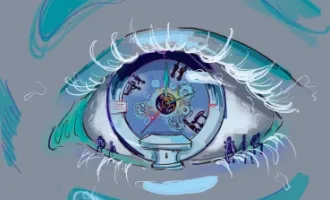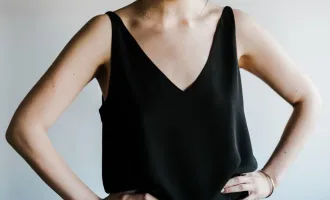
Inside Voice
[Storytelling Contest first place winner in the fiction category.]
It was all mixed up inside of her. She kept seeing the beach house, or rather the view from the beach house, every time she closed her eyes — grey sand flats and the high pier with long, spidery legs at low tide. The sky was overcast, and sunlight reflected from the sand in dull splotches. She stood barefoot, shivering. Out at the water’s edge, gulls circled and cried, diving into the sea.
Suddenly, she began to run. Her feet slapped the wet sand, and as she neared the water’s edge, the sharp stench of the gulls filled her lungs—she burst into them at full speed, stomping and kicking the water into arcs of spray. The birds scattered, screaming. She screeched back at them, hunching her shoulders and splaying her fingers, stretching her arms out in giant wings.
Nearby, a group of men huddled around a hole in the sand. When she tired of the seagulls, she dropped her arms and walked over to them. She was shy, now, quiet and watching. The men were shirtless and sweating, drinking stale-smelling beer.
“Hi, pink feet.” One of them smiled at her. Her legs were still numb from the water.
“Catch any seagulls today?”
She shook her head.
“We’re digging for geoduck,” the man said. “John’s making a hole, see. Once he gets deep enough, someone’ll get in and search for the shell.”
John dug quickly, the blade of his shovel glinting. His neck wet with sweat. From time to time, he stopped to measure the shovel against the edge of the hole. When it was deep enough so that the beach was level with the handle, he looked sternly at Joyce.
“You’re up,” he said.
She lowered herself into the hole. It was cold, smelled like fish. She knelt down on the bottom.
“Dig your arm in all the way and feel around for something soft,” the first man said.
Joyce worked her fist into the side of the hole, burrowing her arm in the sand until her cheek was pressed against the wall. Pebbles scraped her fingers.
“I don’t feel anything,” she said. But she continued to knead the sand, wriggling her arm, and eventually her fingers brushed something sharp and ridged that felt like a shell.
“Oh!”
The man squatted down at the edge of the hole. “Good,” he said. “Before you pull it out, remember that the geoduck is stuck in place. It’s the sand you’re working against.”
Again, she wriggled her fingers until she had the shell in her palm. Then she pulled. It didn’t move. She pulled again. And again. Her arm began to ache.
She took a deep breath, then pulled harder than ever, her knees digging into the sand. This time, it slid a little. Now she could feel the fleshy part of it, the soft edge that poked out from the shell, and she gripped the edge and pulled. Slowly, an inch of her arm emerged from the wall. Then the wet sand made a sucking noise, and collapsed around her forearm. She squinted up at the men.
“I can’t. It’s like concrete.”
They chuckled.
“Do you have the soft part?” the squatting man asked.
“I think so.”
“Then you’re alright,” he said. “Hold onto that and pull slowly against the sand.”
She shut her eyes and pulled hard, but steadily, her chest heaving with effort. Finally, her elbow emerged. Then she knew that she would have it, and it was easy, once she knew. When she pulled it from the sand, she held it up for the men with a shaking arm. They all clapped and whistled.
She gave the shell to the one who was squatting, and he set it down on the sand and pulled her out of the hole by her armpits. It was hers, he said. He washed the sand from it in a plastic bucket and held it up for her to see. It was hideous. Its yellowed snout dangled like a thick, fat worm.
He took a knife and cut the snout from the shell. “This is the siphon,” he said. Then he sliced it down the middle—Joyce was surprised by the pearly color of the inside—and passed thin slices of the white meat around. It tasted crisp, briny.
“Go take this home and put it in salty water.” He handed her the shell. “Good job. What’s your name?”
“Joyce.”
“That’s a pretty name. I’m Ray.” He shook her hand. “Nice to meet you, Joyce.”
Half running, bursting with pride, she cradled the clam with both hands on her way back to the house. The red umbrellas were fanned out on the balcony and her mother read beneath them.
“I dug this.” She set it down on the table.
“Geoduck, huh? Did you thank those nice men for helping you?”
Joyce blinked. I helped them.
Her mother squinted out at the beach, shading her eyes with her hand. If she recognized the men, she didn’t say. “Go wash, Joyce. You smell like fish.”
“He said to put it in water,” Joyce said, looking at the geoduck.
“Alright, I’ll do it. Go, now.”
In the shower, Joyce shut her eyes and tried to imagine what it felt like to be a clam. She’d been buried before—she could remember the weight of the warm, wet sand on top of her chest. The shower felt like that, a bit. It was nice to be touched in so many places.
On the balcony, the geoduck sat on the table next to the overturned book—her mother’s dress was a blue smudge out on the beach amongst the men. Joyce took the geoduck inside and put it in a big bowl with salt and water, swirling the salt with her hands. It sank. “Are you alive?”
She watched it for signs, but it didn’t do anything. Maybe it was shy. She pretended to yawn, narrowing her eyes to slits. Nothing.
“Guess I’ll go, then.” She walked away from it. After counting to sixty, she tiptoed back, crouching beneath the counter.
“Joyce,” her mother said, coming in through the sliding door, “would you like to learn how to cook that clam tonight?” She was smiling.
Joyce considered. “You mean he’d have to die.”
“He’s dead, honey. His nose is cut off.”
Joyce looked at the geoduck.
“You and I have been invited to a very special clambake tonight,” her mother said. “It’ll be fun!”
Joyce put on her yellow dress and white sandals and her favorite sparkly headband. From the bathroom, she heard the drone of the hairdryer. She tiptoed down the hall and opened the door just a crack—her mother stood in front of the mirror, laughing and smiling at herself. Her long, dark hair was flying everywhere, swirling up around her face.
“Joyce,” her mother said, turning off the hairdryer, “it’s impolite to spy. Get in here and tell me if I look good from my right side when I laugh.”
Joyce grinned, pushing the door open. “You look beautiful!” Her mother had dazzling blue eyes, hoops in her ears. Her shirt was open so that you could see the freckles on her chest, and her smiling face was so nice, Joyce wanted to kiss her. She knew Ray would think so, too. She’d make sure to look at his face when he saw her.
“I want you on your best behavior tonight. Inside voice only. You hear?” They were walking to Ray’s house. Joyce carried the bowl with the geoduck.
“Okay.” She hoped there’d be other kids to play with.
They stopped in front of a faded yellow house, and her mother rang the doorbell. A big man with a moustache and a flannel shirt opened the door.
“You made it!” He grinned, his eyes shining as he looked at Joyce’s mother. “And you brought the guest of honor, I see.”
“Of course. I hope it’s still edible,” her mother said. “Joyce has been so excited.”
Inside the house, men and women were sitting on couches and holding drinks, nodding their heads at each other. More of them stood in the hallways. The man said his name was Rob. He showed Joyce to the kitchen, where a few people were chopping and putting things into bowls. He got a chair for Joyce to stand on. Then he showed her how to slice the geoduck—he cut it along the seam and pried the shell open from the sides, carving the meat out. She washed it and trimmed the edges like he showed her.
“Good,” he said. “Now we add it to the chowder.” They dropped the strips of meat one by one into a simmering pot.
Afterwards, Rob took her behind the house and showed her the special garbage bin for shells.
“This way, they go back to the ocean so that other geoducks can use them.” The bin was full to the brim with shells.
Joyce couldn’t believe her eyes. “You caught so many!”
“We got a lot of hungry people.” He grinned.
Joyce placed her shell gently on top of the pile.
There weren’t any other kids at the party, but watching the adults was okay, too. Everyone was nice to her. She looked around for Ray—she wanted to tell him that she knew about his shell bin. She figured he’d be impressed. She didn’t see him, though.
She found her mother in the kitchen—she was leaning back against the countertop and drinking a glass of wine, smiling, nodding her head slowly at Rob. Her cheeks looked like apples. Rob was chopping onions on a cutting board.
Joyce walked over to them. “Mom, where’s Ray?”
“Who?”
“He helped me get my geoduck.”
“Ray’s probably home,” Rob said. “He’s got a new baby, so he doesn’t come to much. Only time you can count on seeing him is a dig.”
“But this is his house,” Joyce said.
Rob laughed. “This is my house, Joyce.”
***
“You’re not crying?”
Joyce looked up in surprise. “What?”
“You’re not crying. But you’re cutting onions. I’m impressed,” he said. “More wine?”
“I’m alright, thanks. Sorry, you were saying?” She smiled.
“Oh, I don’t know. I was just saying I don’t know why I ever decided to go to grad school.” He rolled his eyes.
Somehow, they couldn’t get away from talking about how pretentious his professors were. It was either that or Walter Benjamin or the commodification of academic research.
“The aesthetic,” he explained, “is an inherently political subject.”
Jesus, she thought. This means nothing to me.
When she’d imagined dating a writer, it hadn’t been like this. When she’d imagined it, she’d brought him to the beach. Was she wrong? Or was this wrong? Expectations of intimacy churned inside of her. She couldn’t tell which were realistic, and which were silly—regardless, she feared she was more alone than she pretended.
***
“Wasn’t he so nice?” Joyce’s mother murmured, lying in bed later that night. Her eyes were shut, and her breath smelled sour with wine.
They slept together every night, back then, in the room next to the kitchen. The bed was lumpy, and small, but it was nice not to be alone. Slitting her eyes, Joyce looked at the dark shape of her mother and pretended it was Ray.



